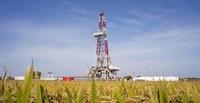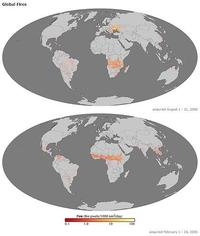-
Risk assessment of shale gas fracking to biodiversity

Fracking, the controversial method of mining shale gas, is widespread across Pennsylvania, covering up to 280,000 km² of the Appalachian Basin. New research explores the risks posed to biodiversity including pollution from toxic chemicals, the building of well pads and pipelines, and changes to wetlands.
-
-
New Jersey faces costly water infrastructure upgrades

Before Hurricane Sandy hit New Jersey, state officials knew they had much work ahead of them to update the state’s water infrastructure. The damage Sandy inflicted only highlighted the inadequacies of New Jersey’s outdated wastewater, stormwater, and drinking water infrastructure. Upgrading the system will be costly, but not doing so will be costlier.
-
-
Environmental group sues State Department for Keystone XL-related files
The Sierra Club has announced it is suing the State Department for files related to an environmental review draft of the Keystone XL pipeline. The group tried to gain access to the files through the Freedom of Information Act, but the request was denied, so the group filed the suit on Monday in the U.S. District Court in the Northern District of California.
-
-
Making jet fuel from switchgrass

The Energy Department’s National Renewable Energy Laboratory (NREL) is partnering with Cobalt Technologies, U.S. Navy, and Show Me Energy Cooperative to demonstrate that jet fuel can be made economically and in large quantities from a renewable biomass feedstock such as switch grass. The project could spur jobs in rural America, lead to less reliance of foreign oil.
-
-
Better weather predictions for the U.S. Navy
In a development that should significantly affect fleet operations, the U.S. Navy has adopted a new global weather forecasting model. The Naval Global Environmental Model (NAVGEM)could inform Navy operations for years to come. It is particularly important as U.S. fleet presence increases throughout the Asia-Pacific region, known for intense weather events like typhoons.
-
-
Protecting and climate proofing Europe’s coast
The coastline of EU member states extends over 17,000 kilometers. It is home to seventy million inhabitants. The estimated value of the assets within 500 meters from the coast rises to a staggering 1,000 billion Euros. An EU-funded science and engineering initiative is gathering all relevant scientific knowledge to develop a systematic approach to deliver a safe, natural, and climate-proof European coast.
-
-
U.S. unlikely to meet its biofuel goals

The Energy Independence and Security Act of 2007 (EISA) mandates that by 2022 the United States derive fifteen billion gallons per year of ethanol from corn to blend with conventional motor fuels. A new study says that if the climate continues to evolve as predicted by the Intergovernmental Panel on Climate Change, the United States stands little to no chance of satisfying its biofuel goals.
-
-
Wildfires in west, southwest forcing hundreds from their homes
The arrival of summer has typically been accompanied by an increase in the number and intensity of wild fires in the U.S. southwest, and this year is no exception.
-
-
California Democratic lawmakers want a go-slow approach to fracking
California may be on the verge of an oil rush. It is estimated that hydraulic fracturing, or fracking, at the Monterey Shale formation may tap reserves of fifteen billion barrels of oil. Democratic lawmakers do not see it that way, and have proposed numerous anti-fracking bills aiming to control the use of the controversial technology. Ten bills have been tabled so far, and more are on the way.
-
-
As wildfires increase, scientists call for more study of terrestrial, atmospheric effects

Wildfire is a disturbance of ecosystems, and concerns continue to grow about the terrestrial and atmospheric effects of wildfires. Wildfires are expected to increase 50 percent across the United States under a changing climate, over 100 percent in areas of the West by 2050 as projected by some studies.
-
-
GOP lawmakers urge Obama not to link Keystone decision to climate policies
Democrats who are uncomfortable with the Keystone XL pipeline have urged President Obama to consider attaching policies requiring cuts in greenhouse gases emissions to his approval of the project. Republican lawmakers are urging the president not to link approval of Keystone to climate change policies.
-
-
Administration more actively to support expansion of fracking
The Obama administration is leaning toward offering more active support for the expansion hydraulic fracturing, or fracking, despite the opposition of environmental groups.
-
-
House will see floor battle today over Keystone XL pipeline
Republican and Democrats lawmakers are set to engage in a fierce battle on the House floor over the fate of the Keystone XL project. Representative Lee Terry’s (R-Nebraska) proposed legislation to allow TransCanada to start construction of the Keystone XL pipeline, which runs from Hardisty, Canada through seven states to Houston, Texas. The bill will come to the House floor today.
-
-
Algae could become an important source of fuel in U.S.

A new analysis shows that the U.S. land and water resources could likely support the growth of enough algae to produce up to twenty-five billion gallons of algae-based fuel a year in the United States, one-twelfth of the country’s yearly needs.
-
-
Asteroid 1998 QE2, nine times larger than cruise ship, to glide past earth

Two weeks from now, on 31May 2013, asteroid 1998 QE2 will sail serenely past Earth, getting no closer than about 3.6 million miles, or about fifteen times the distance between Earth and the moon. While QE2 is not of much interest to those astronomers and scientists on the lookout for hazardous asteroids, other asteroids are. NASA recently announced developing a first-ever mission to identify, capture, and relocate an asteroid for human exploration.
-
- All
- Regional
- Water
- Biometrics
- Borders/Immig
- Business
- Cybersecurity
- Detection
- Disasters
- Government
- Infrastructure
- International
- Public health
- Public Safety
- Communication interoperabillity
- Emergency services
- Emergency medical services
- Fire
- First response
- IEDs
- Law Enforcement
- Law Enforcement Technology
- Military technology
- Nonlethal weapons
- Nuclear weapons
- Personal protection equipment
- Police
- Notification /alert systems
- Situational awareness
- Weapons systems
- Sci-Tech
- Sector Reports
- Surveillance
- Transportation
Advertising & Marketing: advertise@newswirepubs.com
Editorial: editor@newswirepubs.com
General: info@newswirepubs.com
2010-2011 © News Wire Publications, LLC News Wire Publications, LLC
220 Old Country Road | Suite 200 | Mineola | New York | 11501
Permissions and Policies
Editorial: editor@newswirepubs.com
General: info@newswirepubs.com
2010-2011 © News Wire Publications, LLC News Wire Publications, LLC
220 Old Country Road | Suite 200 | Mineola | New York | 11501
Permissions and Policies
